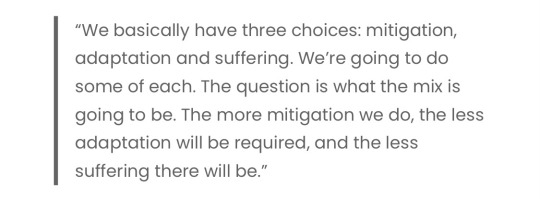Founder: FutureWork IQEn-ROADS Climate Ambassadorb. 316 ppm
Don't wanna be here? Send us removal request.
Text
Let me tell you a quick story of what we have been dealing with. This year as if out of the blue the costal town we are in saw a dramatic departure in rainfall over the 10 year average.
Normally the month of November has about 85mmm of rain. This November we had 2mm.
Suddenly everything has got very dry. The vegetation is thinning and turning brown as the plants die from lack of water. Of course there is a deadly knock effect as wild berries and fruit become scarce for birds and insects. Many will reach the boundary of their ability to adapt.
The risk for fire rise exponentially, with the memory fresh from the giant fire there was here in 2017 that destroyed 100’s of homes.
The water situations has become dire necessitating the introduction of water restrictions (water is now solely for human consumption. No watering of gardens or washing of cars etc. and rationing is not ruled out.
This is climate change in action as projected by the models (see insert)

The area faces 3 major risks: drought and its accompanying water shortage, wildfires made possible by the very dry conditions and sea level rise threatening some homes in the area.
The march of climate change is painfully visible here and there is no going back as emissions keep rising putting us on course to cross 1.5° of heating before we reach 2030.
There is a sense of foreboding in the air.
0 notes
Text
The math has been done — some time back already but we chose to ignore it — and this is what must happen next.

As you can see this requires an immediate re-engineeringing of the way we do everything.
Right now there is absolutely no indication that we believe the science or the conclusions it requires us to make.
Just look around you, everything is business as usual. The airports are packed, highways are packed, corporate events are packed, business as usual, data and science be damned.
Prediction: This is all set to change in dramatic fashion when we experience the next El Niño event starting later next year. This event will push the global average temps from where they are now (1.3° above pre-industrial) to 1.5° with catastrophic effects.
Will this force us to radically reduce carbon emissions in an emergency style way?
Time will tell.
Any leadership team that embarks on an immediate process to decouple from as many fossil fuel touchpoints as they can and think very clearly of how adapt to a 1.5° world will be removing large amounts of disruption in their future.
What is your plan?
0 notes
Text
When the pandemic struck many businesses were caught out because of a lack of digital literacy and fluency making remote work a very painful experience!
Now as we face something larger and more disruptive than a pandemic another knowledge gap has surfaced in many organisations as is born out by this recent survey data conducted in six regions around the world.
There are two major things hurtling at ALL businesses:
1) Extreme weather events
2) Stringent mitigation regulation
Without high levels of climate literacy both these are going to catch businesse completely off-guard.
If there was ever a time to fill this knowledge gap it’s now!

0 notes
Text
Cutting our transportation emissions.
Since we all need to move from A to B our transportation touch points are inevitable.
But can we be smarter about the choices we make on 𝘩𝘰𝘸 to get from A to B?
Most definitely!
Here is a look at transport choices we can make every day that have a big emission reduction impact.
🚘 Ditch the car
✈️ Fly less!
🚝 Use public transport more
🚶♀️Walk to your destination if you can
🚲 Cycle to your destination if you can
(Graphic Source)

0 notes
Text
Petrostates will not go quietly!
" "There is no legitimacy in a COP president promoting gas and oil alongside false solutions like CCS”, said David Tong, global industry campaign manager at Oil Change International (OCI), who is attending COP27. “This is a distraction from the reality that we need to keep oil, gas, and coal in the ground.”
Tong pointed to a recent OCI report that found that the UAE is on track to undergo one of the world’s largest expansions in CO2 emissions associated with oil and gas production between 2023 and 2025. “All of this expansion is inconsistent with the Paris Agreement,” Tong said."
3 notes
·
View notes
Text
We are completely deluded...
I just read this piece on how climate change will effect future world cups
So this is an honest question. If we are in a climate emergency (which we are according to the physics) how can even the current event be justified.
Estimates from Lancaster University are that this event will have a 10 million ton plus footprint.
We will be paying for these emissions for the next 300 - 1,000 years!
In the meantime we are racing ahead to 1.5ºC to be passed around 2034 or much sooner if we have a strong El Niño in 2023.
I must be honest I think we are all completely deluded. We are looking at all the data and just refuse to believe that we are heading over the cliff.
0 notes
Text
As we face our biggest global challenge head on, the words of John Holdren, the president of the American Association for the Advancement of Science and an energy and climate expert at Harvard carry great importance.
This gets to the crux of it all:

(Quote Source)
1 note
·
View note
